 Petzlover
Petzlover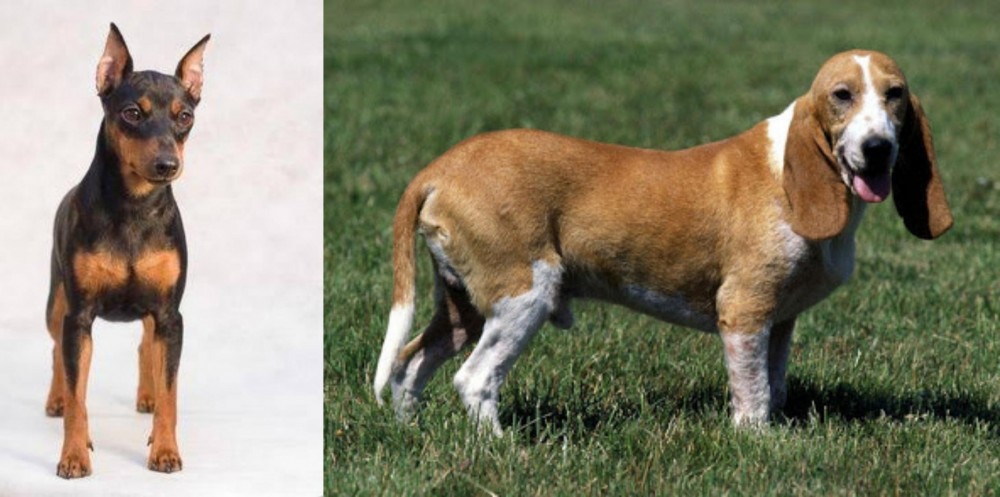 Miniature Pinscher is originated from Germany but Schweizer Niederlaufhund is originated from Switzerland. Miniature Pinscher may grow 13 cm / 5 inches shorter than Schweizer Niederlaufhund. Miniature Pinscher may weigh 10 kg / 22 pounds lesser than Schweizer Niederlaufhund. Both Miniature Pinscher and Schweizer Niederlaufhund has almost same life span. Both Miniature Pinscher and Schweizer Niederlaufhund has almost same litter size. Both Miniature Pinscher and Schweizer Niederlaufhund requires Low Maintenance.
Miniature Pinscher is originated from Germany but Schweizer Niederlaufhund is originated from Switzerland. Miniature Pinscher may grow 13 cm / 5 inches shorter than Schweizer Niederlaufhund. Miniature Pinscher may weigh 10 kg / 22 pounds lesser than Schweizer Niederlaufhund. Both Miniature Pinscher and Schweizer Niederlaufhund has almost same life span. Both Miniature Pinscher and Schweizer Niederlaufhund has almost same litter size. Both Miniature Pinscher and Schweizer Niederlaufhund requires Low Maintenance.
 The Miniature Pinscher hails from Germany. It appears to be an ancient dog breed, going back hundreds of years and being used to kill vermin.
The Miniature Pinscher hails from Germany. It appears to be an ancient dog breed, going back hundreds of years and being used to kill vermin.
He is a distinct breed and much older than the Dobermann Pinscher. Development of this small dog started way back in 1895 when the Pinscher Klub was formed. It was renamed the Pinscher-Schnauzer Klub and the first breed standard was also written.
By 1929, the Miniature Pinscher Club of America was formed.
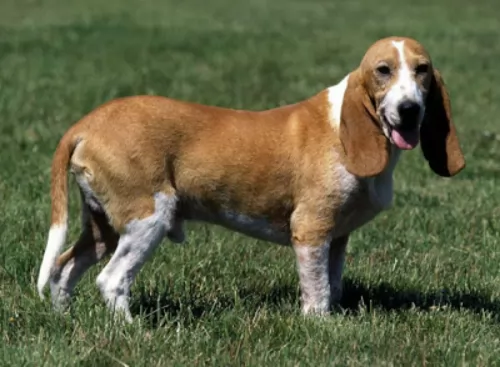 Originating in Switzerland, the Schweizer Niederlaufhund was established around 1900, when hunting became restricted to districts. The Swiss hunter needed a slower dog for the limited territory they could hunt in. Crossing selected Schweizer Laufhunds with Basset Hounds and other selected smaller, short legged hounds developed the Schweizer Niederlaufhund. By 1905 there was already a Schweizer Niederlaufhund Club.
Originating in Switzerland, the Schweizer Niederlaufhund was established around 1900, when hunting became restricted to districts. The Swiss hunter needed a slower dog for the limited territory they could hunt in. Crossing selected Schweizer Laufhunds with Basset Hounds and other selected smaller, short legged hounds developed the Schweizer Niederlaufhund. By 1905 there was already a Schweizer Niederlaufhund Club.
The Niederlaufhund became one of the best hunting dogs in the world, with its powerful body and ability to outhunt the Laufhund in tracking big game. Slower of course than the Laufhund it has a great sense of smell and an ability to easily find wounded animals. There are a few varieties, just like with the Swiss Hound again mostly because of their coloring. The Luzerner Niederlaufhund, the Jura Neiderlaufhund, and the Schwyzerlaufhund. They have musical voices that they use to communicate with the hunters and each other as well as that amazing sense of smell. They can hunt for hours without tiring and without much information from the hunter.
They are a cross breed not recognized by the larger kennel club such as the AKC and the UKC. They are recognized by the Dog Registry of America, Inc. (DRA), the American Canine Association Inc. (ACA) and most importantly by the Federation Cynologique Internationale (FCI). This last one is important because it could lead to recognition as a new breed by the UKC and the AKC.
 This bright, alert little dog stands at 25 to 30cm and weighs in the region of 3 to 5 kg.
This bright, alert little dog stands at 25 to 30cm and weighs in the region of 3 to 5 kg.
The body is lean and muscular with strong, straight legs. He has a short, sleek coat with no undercoat. The coat is black and tan, chocolate or a rusty shade. The ears are erect but sometimes they are half erect and half floppy, the little nose is black and the tail is usually docked. If you allow your Min Pin to breed, you can expect 2 - 6 puppies.
The Min Pin is a bright, feisty, alert toy breed, full of personality and full of spunk, making him an excellent watchdog too.
He isn’t aggressive towards his human family but he is full of attitude and can be aggressive with other dogs. He may be small but he isn’t a lap dog, being way too active for that, loving to be involved in a game or going for a walk.
He is loving with his human family, but training and socialization can make him a better pet, obedient and amicable. He is intelligent too so he learns easily. He gets along well with children but only when those children have been taught to be kind ad gentle with all animals, but particularly with teeny weenies like himself.
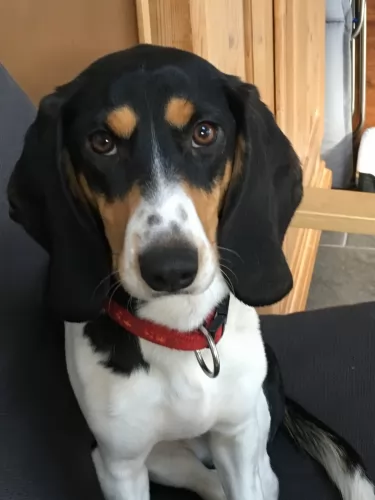 The Schweizer Niederlaufhund is a medium size, short dog. They look like their cousins, the Schweizer Laufhund but smaller. Their body is just slightly longer than it is tall, so you are left with the impression of a mostly square dog. The Niederlaufhund is well put together, with strong legs, a noble head, long droopy ears, broad chest, and a low held tail.
The Schweizer Niederlaufhund is a medium size, short dog. They look like their cousins, the Schweizer Laufhund but smaller. Their body is just slightly longer than it is tall, so you are left with the impression of a mostly square dog. The Niederlaufhund is well put together, with strong legs, a noble head, long droopy ears, broad chest, and a low held tail.
The Small Lucerne Hound has a white cote with smooth speckles of black or gray making them appear to be blue.
The Small Bernese Hound has a tricolor coat of white, tan and black. There are tan marks on the eyebrows. There is a wire haired Small Bernese as well. He has a short beard.
The Small Schwyz Hound is smooth coated in white with orange or yellow-red patches. The wired haired version is extinct.
The Small Jura Hound is a single coated dog with a black coat and tan marking above his eyes as eyebrows as well. He might have some white as well.
 The Miniature Pinscher is such a sporty, fun-loving, confident little dog that is also fearless for his small size.
The Miniature Pinscher is such a sporty, fun-loving, confident little dog that is also fearless for his small size.
He thinks he is a ferocious, big Dobermann Pinscher at heart and is ready to guard and protect his family with everything he’s got.
He is full of energy too and always ready for his daily walk and other forms of exercise and games.
He may be small, but he doesn’t want to be a lap dog, as he is too active for that. He can be highly entertaining and he promises to make you the most devoted and loving little family pet.
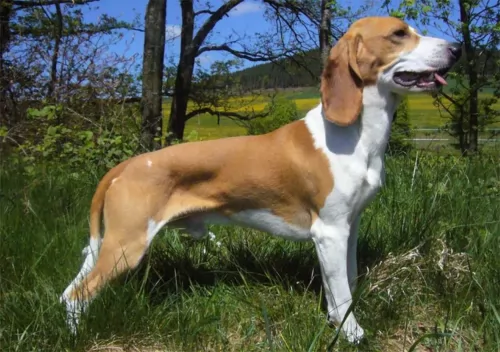 Children friendliness – yes, they are but use caution around small children and small prey.
Children friendliness – yes, they are but use caution around small children and small prey.
3. Adaptability - needs room to run and explore – is very frustrated when confined.
 Min Pins are robust little dogs and can enjoy good health when looked after properly. They can reach 15 years of age and even more.
Min Pins are robust little dogs and can enjoy good health when looked after properly. They can reach 15 years of age and even more.
Just like with any other dogs though, they’re prone to certain health conditions. Your Miniature Pinscher is highly unlikely to get any of these diseases, but it's good to be aware of some of them.
Progressive Retinal Atrophy, known as PRA for short is an eye disease where there is gradual deterioration of the retina. You will no doubt see your dog being affected with night blindness – not being able to find their way around as they usually do.
Legg-Calve-Perthes Disease is a hip joint problem that often affects toy breeds. The blood supply to the head of the femur is decreased and you’ll notice your pet limping. It’s not an ailment reserved for old dogs either but can be found in puppies that are just 4 months of age.
Hypothyroidism is a disorder of the thyroid gland and can lead to skin conditions with your dog as well as lethargy, hair loss and obesity.
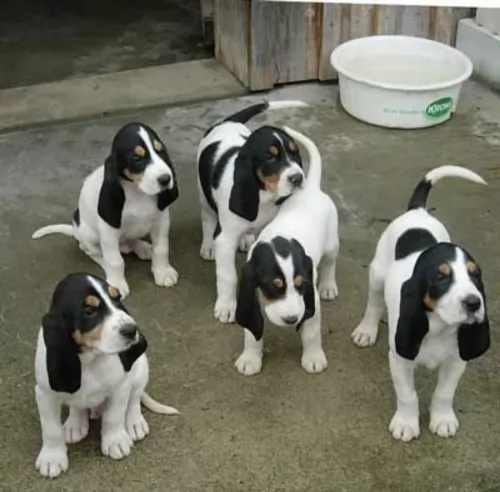 The Niederlaufhund Is prone to a very medical issues to keep an eye on. They include:
The Niederlaufhund Is prone to a very medical issues to keep an eye on. They include:
• Hip Dysplasia – This comes from hip joints that are not well formed and cause reduced mobility and pain. Parents can be tested before the dogs are bred to make sure their hips are good, and that dysplasia will not be passed to puppies. This dysplasia can cause arthritis and even lameness.
• Ear Infections – With long drooping ears it is easy for the dog to acquire ear infections. This is even more so for a hunting dog like the Niederlafhund. It is important to clean the dog’s ears on a regular basis.
 Grooming is easy and you will simply need to brush him twice a week as his coat is short and smooth. There is really no need to bath the Min Pin and you could even take a damp cloth and wipe him down to avoid using a shampoo which could dry the skin.
Grooming is easy and you will simply need to brush him twice a week as his coat is short and smooth. There is really no need to bath the Min Pin and you could even take a damp cloth and wipe him down to avoid using a shampoo which could dry the skin.
Always check his eyes and ears for infection and check for fleas and ticks too. His nails will need to be trimmed, more so if he doesn’t wear them down naturally.
Check your dogs teeth. Small dogs are more prone to dental disease and you want to brush his teeth 2 or 3 times a week with special canine toothbrush and toothpaste to avoid dental problems.
The amount your Miniature Pinscher eats will be determined by his age and his activity levels.
When you buy commercially manufactured food, you will need to buy food that is recommended for small, energetic dogs. You don’t want to feed your pet dry kibble day after day, so a tasty, nutritious treat is to add finely chopped up boiled chicken, brown rice of pasta and some cooked vegetables such as potatoes, carrots and spinach into his kibble.
All dogs, but particularly little dogs, love simple food that is consistent like what has been mentioned. They don’t do well on strange, exotic kinds of foods as it upsets the stomach. Make sure he has cool, fresh water available to him at all times, night and day.
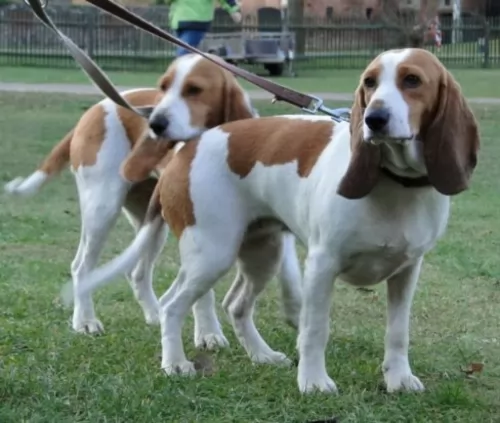 1Feeding the puppy - give 1 cup per day of high quality dog food divided into 3 meals.
1Feeding the puppy - give 1 cup per day of high quality dog food divided into 3 meals.
2.Feeding the adult – give one and one half cups of high quality dog food divided into 2 meals.
4. Games and Exercises – needs a lot of daily exercise and loves field trials, running and activities like barn hunt.